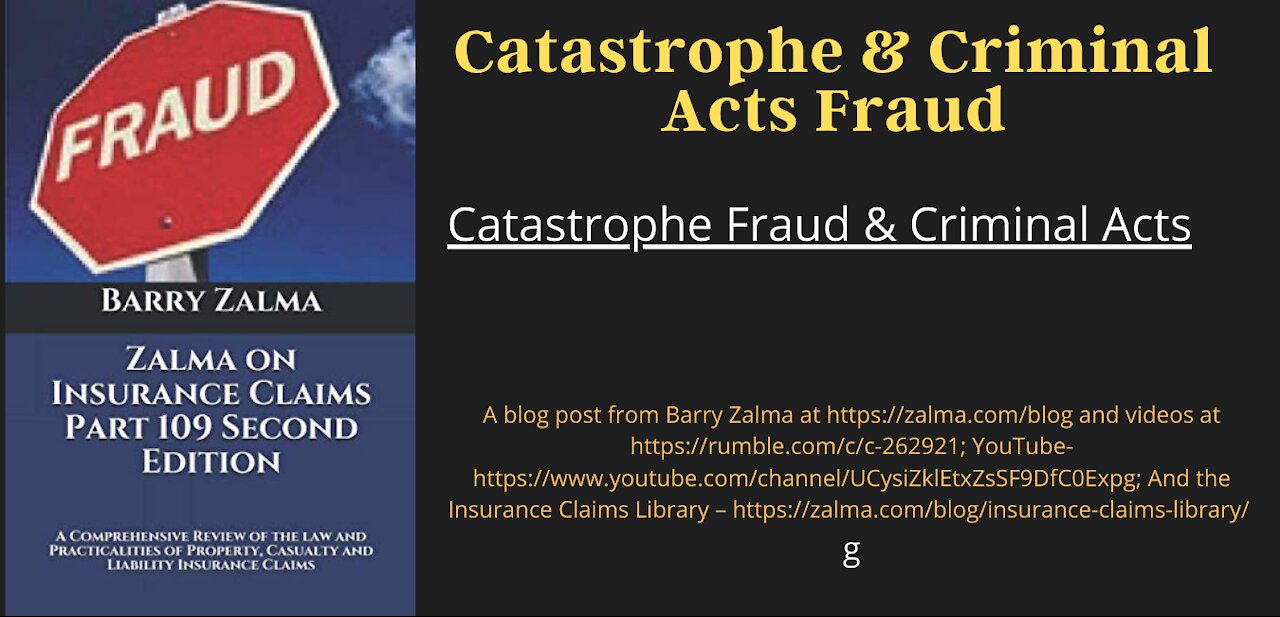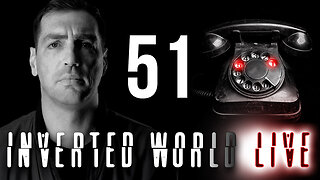Premium Only Content

Catastrophe Fraud & Criminal Acts
Catastrophe Fraud
According to the Coalition Against Insurance Fraud, and general experience, natural disasters are always followed by fraud. The sheer size of the cleanup created by Katrina and the other hurricanes since 2005 has ignited the biggest glut of litigation and insurance fraud attempts in the history of US disasters.
Lt. Allen Carpenter, head of the Louisiana state police insurance fraud unit, which is the focal point for suspicious claims from the state, said:
In a normal catastrophe, about 11 percent of claims are fraudulent. I think the percentage of fraudulent claims will be the same, but it’s just such a large catastrophe that the numbers will be greater. What’s going to be different is the wide extent of the flood and the overall number of fraudulent claims.
Criminal Acts Relating to Insurance Fraud
Where a yacht policy contained a provision excluding coverage for “any loss, damage or liability willfully, intentionally or criminally caused or incurred by an insured person,” the First Circuit Court of Appeals found no coverage where the operator of the boat was convicted of criminal negligence that resulted in the death of a passenger in his boat. [Littlefield v. Acadia Insurance Company, 392 F.3d 1 (1st Cir. 12/08/2004)]
The court based its decision on the fact that even in the absence of a statutory requirement of intent, under New Hampshire state law, “a person cannot be convicted of a crime,” including a misdemeanor, “without proof that the unlawful act was accompanied by a culpable mental state.” Negligent operation of a watercraft, in the absence of the requisite culpable mental state, could not be a crime and would not trigger the exclusion provision in Section B of the policy. Hence, criminal negligence differs from civil negligence under New Hampshire law in important ways, and the yacht policy provides meaningful coverage for loss or liability incurred through negligence other than the criminal act.
Rex K. DeGeorge, a lawyer, charged with fraud, unsuccessfully appealed his conviction and sentence following a month-long jury trial for conspiracy, mail fraud, wire fraud, and perjury. The government proved to the trier of fact that DeGeorge participated in a scheme to defraud an insurer by purchasing a yacht, inflating its value through a series of sham transactions, obtaining insurance on the yacht at the inflated value, scuttling it off the coast of Italy, and attempting to collect the insurance proceeds, in part by lying about the cause of the sinking during civil litigation with the yacht’s insurer.
-
 7:40
7:40
Barry Zalma, Inc. on Insurance Law
1 year agoLoss of Inventory by Bankruptcy
180 -
 8:21
8:21
Hunt4TheTRUTH
4 years ago $0.25 earnedCRIMINAL FRAUD! THEY DID NOT HAVE ENOUGH!
8051 -
 3:09
3:09
KMGH
4 years agoCriminal investigation underway into Colorado construction company, contractor accused of fraud
1351 -
 UPCOMING
UPCOMING
Game On!
16 hours agoMadden 26 Cover REVEALED! Eagles Fans Should Be WORRIED!
1741 -
 LIVE
LIVE
BEK TV
23 hours agoTrent Loos in the Morning 6/3/2025
1,899 watching -
 3:03:32
3:03:32
FreshandFit
10 hours agoGirl Gets KICKED Off The Pod During Spin The Wheel!
210K62 -
 2:21:39
2:21:39
Inverted World Live
11 hours agoThe Clone and Alien Invasion | Ep. 51
90.3K22 -
 2:42:59
2:42:59
TimcastIRL
12 hours agoTrump SLAMS Biden Over Boulder TERROR Attack, Protecting Illegals & Leftists | Timcast IRL
214K68 -
 LIVE
LIVE
TylerTodayNews
5 hours agoHorror game with friends! Then fighting the galactic war | REPO & Helldivers 2 | Tyler Today Games
183 watching -
 LIVE
LIVE
TheBeardedBrent
3 hours ago🔴LIVE🔥 | WARZONE | THE CASUAL KING | ROAD TO 50 SUBS!!🔥
146 watching